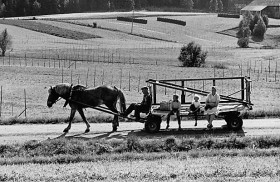But slowly disappears the drama documentary and the film director Nekrasov becomes the investigative journalist, who goes from place to place, from Moscow to London to New York, searching for the truth, discovering that Magnitsky was called upon as a witness in the financial fraud case and not as someone accused, and that he never mentioned the name(s) of the policemen in the first official report…
Her er Tue Steen Müllers anmeldelse fra 4. juli 2016 af The Magnitsky Act endnu en gang, for filmen blev denne uge aktuel da tidsskriftet Ekko inviterede i biografen, i Empire i København i tirsdags: ”Mød Mads Brügger i samtale med Andrei Nekrasov om hans The Magnitsky Act. Dokumentaren stempler ’Putins fjende nr. 1’ som svindler.
Han er kendt som en af Putins skarpeste modstandere. Og historien om systemkritikeren Sergei Magnitsky, der blev tortureret til døde i fængslet, lå lige til højrebenet. Men da den russiske instruktør Andrei Nekrasov graver dybere i sagen, begynder historien langsomt at smuldre. Systemkritikeren blev ikke tortureret, og sagen handler ikke om russisk korruption, men om en amerikansk mangemillionær, William Browder, der angiveligt har berøvet Rusland for 230 millioner dollars og dækker sig bag ’kampen’ for menneskerettighederne i landet…” (Frida Marquard, Ekko, 5. oktober 2016)
Dorte Hygum Sørensen var til stede i Empire biografen i tirsdags og skrev i sin reportage til Politiken: ”… Nekrasovs film er så kontroversiel, at stort set ingen vil vise den. Visningen i Empire er en af de første i verden. Europaparlamentet har afvist at se den, den tyske tv-kanal Arte har aflyst at vise den, og Andrej Nekrasovs omdømme som troværdig, Putin-kritisk instruktør er p.t. i fare for fuldstændig at smuldre, efter at han i manges øjne med ’The Magnitsky Act’ forsvarer dele af det russiske system. Efter visningen interviewes Andrej Nekrasov foran publikum af dokumentarist og journalist Mads Brügger, der spørger, hvad der nu skal ske med den russiske instruktørs film. ‘Det ved jeg ikke’, lyder den korte version af et af Andrej Nekrasovs meget lange svar.
Andrej Nekrasov virker både oprigtigt lettet over muligheden for at vise sit værk for et publikum og også rystet over de mange negative reaktioner, filmen mødes med rundt omkring i verden. Tidligere har han lavet film om forgiftningen af Putin-kritikeren Aleksandr Litvinenko. Med ’The Magnitsky Act’ har han skabt en film, der forsvarer en konkret russisk politimand samt dele af russisk lovgivning og kritiserer en amerikaner, der er kendt for sit engagement i menneskerettigheder i Rusland. Det er så kontroversielt, at Nekrasov risikerer at miste alt, han har bygget op, siden han debuterede i slutningen af 80’erne. Efter liveinterviewet spørger jeg Mads Brügger, hvad han synes om Nekrasovs film: ’Jeg vil sige, at en mand med hans historik kunne ikke have lavet en mere modig film’.” (Dorte Hygum Sørensen, Politiken, 15. oktober 2016)
http://www.ekkofilm.dk/artikler/magnitsky-act-ekko-viser-filmen-kun-fa-tor-vise/
http://politiken.dk/kultur/filmogtv/ECE3427474/putin-kritisk-instruktoer-kunne-ikke-have-lavet-en-mere-modig-film/
(ABN)
REVIEW
by Tue Steen Müller
The Magnitsky Act has the subtitle ”Behind the Scenes” and indeed this is what it does, or rather where he takes us, Andrei Nekrasov, known for his controversial film on the poisoning of Litvinenko, for his ”Russian Lessons” that deals with the Russian-Georgian war and for his tv series ”Farewell Comrades”. In other words Nekrasov is an experienced, professional director behind big international films. His new film digs into what actually happened to Sergey Magnitsky, who died in a Moscow prison in 2009, where he had been sitting for 380 days, arrested by the police after having reported a financial tax fraud of considerable size. To the authorities.
Magnitsky, a young lawyer, was hired by American lawyer and investor, based in London, William Browder, who has been insisting, since then, on Magnitsky being tortured to death, and has made himself a human rights activist and a ”Public Enemy no. 1” of Putin’s Russia.
Browder went to the US Congress, had an Magnitsky Act passed and signed by President Obama, an act that made Russian officials involved in human rights conflicts banned to enter the US.
About the overall narrative of the film: Step by step, Nekrasov gets closer to people and documents around the case, an insight that makes him question, whether Magnitsky was actually beaten with death as the consequence or whether he died a natural death… and whether this whole story was set up by Browder to clean himself for being involved in the fraud.
I read about the film being taken off the program at the Norwegian Film Festival in Grimstad – the festival was threatened to be sued by Browder and his lawyers – and I read that it was not shown at a planned screening at the European Council because Browder presented papers stating that the film was full of wrong statements and conclusions – for the same reason broadcaster arte/ZDF has put the film on hold to investigate… The film, however, was screened on the initiative of the producer Piraya Films, in Oslo, in Washington at a closed session and at the Moscow International Film Festival some days ago. At the two latter mentioned events raising upheated debates.
A ”hot” film in other words. Thanks to brave Norwegian Torstein Grude from the production company Piraya in Stavanger Norway for letting me watch the film AS A FILM and not as a piece of investigative journalism even if it is also what it is…
So here comes an attempt to make a film review of a film that with its narrative structure includes several film styles, several angles.
This is what makes it interesting, the richness in approaches with three main personalities, Magnitsky, Browder and Nekrasov.
It starts with Nekrasov, who hears about the Magnitsky case and wants to make it into a film. He contacts Browder, who since 2009 has told the story again and again, is a good storyteller, who seems convincing when he talks in between the dramatized sequences of Magnitsky being beaten up in the prison, as Browder says, Magnitsky being arrested in his home by the policemen in front of his wife and two children, the corrupt policemen having meetings with mafia guys in night clubs, the involved mysteriously being killed one after the other, the interrogation by the policemen – ”if you sign here that you did not tell the truth when you reported the crime, you can go home…”. So here Nekrasov presents Browder’s version of the truth. Classical drama with the voice of Browder taking us through the story.
Even if these sequences are sometimes a bit too cliché-filled in the décor, they ”survive” because of the good actors playing Magnitsky and the police officer Karpov. The drama-documentary set-up has music ”from wall to wall” (apparently this is what stories like this must have, it is beyond my understanding that it is necessary), anyway the drama parts are not only interrupted by interviews but also by tv news clips that communicate how the media treated the case.
But slowly disappears the drama documentary and the film director Nekrasov becomes the investigative journalist, who goes from place to place, from Moscow to London to New York, searching for the truth, discovering that Magnitsky was called upon as a witness in the financial fraud case and not as someone accused, and that he never mentioned the name(s) of the policemen in the first official report. Karpov from the police, one of those criminalised by Browder, suddenly comes into the film in a scene, where Nekrasov asks the actor who plays him to be present at the meeting, where Karpov tells Nekrasov his version of the case and why he sued Browder in London, a case that the English court did not want to deal with. Nekrasov often includes the making of the film in the film by letting the viewer see the actors being directed, the cameraman with the camera and himself and the editor in the editing room. It is done without stopping the flow of the film.
It is towards the last third of the film that my notes say ”now it is too complicated”, at least for me, I could not follow the story, when Nekrasov compares documents in Russian and English translation (he calls it manipulation) and explains how Browder and his company performed their creative money game. I get that Nekrasov wants to to prove that Browder lies and manipulates to whitewash his actions and make himself a name, but I don’t get the detailed arguments. Therefore I turned my attention to watching a more and more engaged, almost obsessed investigator Nekrasov, who goes deeper and deeper and who also – and here we are far from the ”heroic” journalist kliché – is in doubt. Is it right what I am doing? Me who has always been critical to my country Russia and to the politics of Putin, me who had to flee the same country because of my criticism… I am now being accused of supporting the same regime.
Even if I have to say that there are doubting scenes/sequences that I find over the top: Nekrasov in chairs contemplating, Nekrasov standing at the window thinking etc. etc. Storytelling clichés… Even so I never doubt the honesty of Nekrasov and his feelings: This is a drama documentary and an investigative documentary and a first person film essay rich in content and form, and courageous in its approach…
… is he right or not – I can not say, let me ”hide” behind the former CIA intelligence officer Philip Giraldi, who – according to the FB of producer Torstein Grude – as one of the first saw the film, and wrote about it, link below:
”To be sure, Browder and his international legal team have presented documents in the case that contradict much of what Nekrasov has presented in his film. But in my experience as an intelligence officer I have learned that documents are easily forged, altered, or destroyed so considerable care must be exercised in discovering the provenance and authenticity of the evidence being provided. It is not clear that that has been the case. It might be that Browder and Magnitsky have been the victims of a corrupt and venal state, but it just might be the other way around. In my experience perceived wisdom on any given subject usually turns out to be incorrect…”
Below there are also links to newspaper articles, American and Russian orientated, about this “scandalous” film that Washington Post called “agitprop”… Torstein Grude says, that he plans to make a follow-up on the media and how they treat(ed) the film. He is going to have a lot of material to draw from!
But first, let this film be shown all over, let debates be held. They will be one-sided first of all, but please bring in nuances as well. From my side: Respect!
Norway, 2016, 145 mins. Filmkommentaren review: 5/6 pens.
http://www.unz.com/article/the-magnitsky-hoax/
http://www.nytimes.com/2016/06/10/world/europe/sergei-magnitsky-russia-vladimir-putin.html?_r=0
https://www.washingtonpost.com/opinions/russian-agitprop-lands-in-washington/2016/06/19/784805ec-33dc-11e6-8ff7-7b6c1998b7a0_story.html
https://www.rt.com/news/346642-magnitsky-film-shown-washington/
https://www.yahoo.com/news/russian-film-challenges-story-behind-us-human-rights-223526531–politics.html
http://www.themoscowtimes.com/opinion/article/behind-the-scenes-of-the-magnitsky-act-op-ed/573943.html
http://www.rferl.org/content/magnitsky-film-on-hold-european-tv-channel-arte/27704772.html




